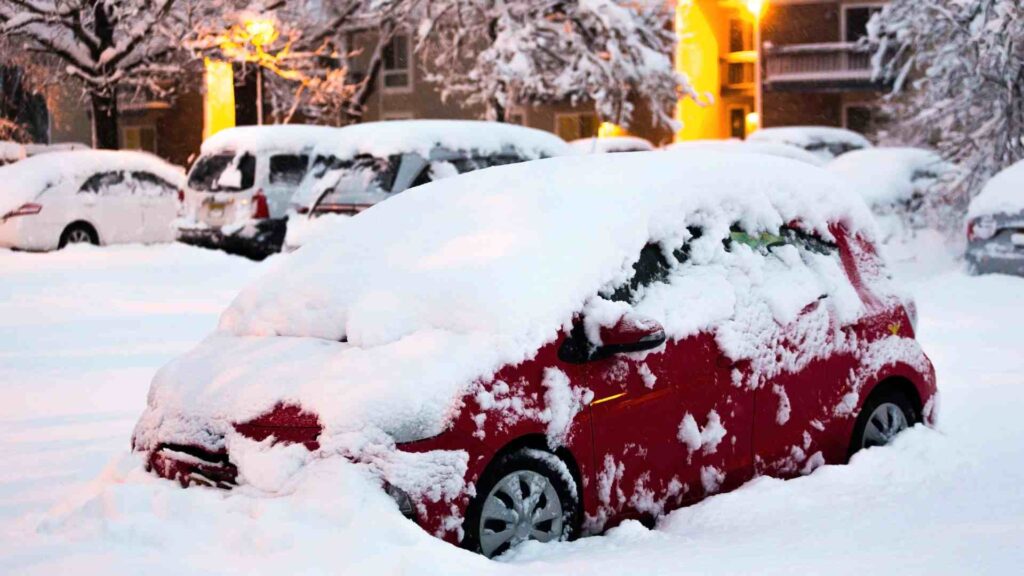7 Common Reasons Why Your Car Won’t Start in Cold Weather: What Every Driver Should Know
As the winter cold sets in, many drivers face the frustrating reality of their vehicles refusing to start in cold weather. The drop in temperatures can significantly affect a vehicle’s performance, leading to a variety of problems that can leave you stranded on a cold morning.
Understanding the common reasons why your car won’t start in the winter is critical for avoiding problems and maintaining smooth running throughout the season. It is also important for drivers who wish to avoid problems and keep their vehicles running smoothly during the winter months.
7 Common Reasons Why Your Car Won’t Start in Cold Weather: What Every Driver Should Know
The Impact of Cold Weather on Vehicles
Cold temperatures can affect multiple components within your vehicle, from the battery to the engine oil, leading to starting difficulties. At temperatures below freezing, the chemical reactions needed for battery function slow down dramatically. This reduction in efficiency can cause a battery that was functioning well in warmer weather to struggle to produce enough power to start the engine. In fact, studies have shown that battery capacity can drop by as much as 50% in extreme cold, making it one of the most common culprits for a car that won’t start in winter.
Furthermore, engine oil thickens as temperatures drop, limiting its capacity to flow freely throughout the engine. This higher viscosity requires the engine to work harder to turn over, increasing the likelihood of a failure to start. The oil’s thickness can cause difficulty, and if the oil isn’t designed for cold conditions, it can worsen these starting problems.
Understanding these various factors can empower drivers to take proactive measures to prevent starting issues. Regular maintenance is crucial, including battery checks, oil changes, and inspections of the fuel and ignition systems. By preparing your vehicle for the cold months ahead, you can reduce the likelihood of facing starting problems.
These issues are a common challenge that many drivers encounter during the winter months. A number of reasons can contribute to a car that won’t start in winter, including the effects of cold temperatures on battery performance, engine oil thickening, and weaknesses in the fuel and ignition systems. Drivers can ensure that their vehicles remain reliable and ready to navigate whatever winter weather comes their way by developing a solid understanding of these challenges and implementing preventive actions.
7 Common Reasons Your Car Won’t Start in the Cold
Understanding the specific reasons behind these cold weather car starting issues can help you diagnose problems quickly and take preventive measures to keep your vehicle running smoothly. Here are the seven most common reasons your car won’t start in the cold, each contributing to those frustrating winter mornings.
Battery Failure
Cold weather is recognized for exposing battery weaknesses. Batteries have a limited lifespan, and as they age, their ability to hold a charge diminishes. In freezing temperatures, a battery that may have been functioning adequately can suddenly fail, often without any prior warning. Signs of battery problems include dimming headlights, slow engine cranking, or an illuminated battery warning light on your dashboard. Regular battery testing, especially before winter, can help you identify weak batteries before they leave you stranded.
Thickened Fluids
In cold weather, various fluids in your vehicle can thicken, particularly engine oil and transmission fluid. Engine oil that is too thick can create excessive resistance in the engine, making it harder to turn over. This resistance can lead to starting difficulties, especially for older vehicles or those not using winter-grade oil. Additionally, transmission fluid that has thickened can impact the overall performance of the vehicle, making it sluggish and unresponsive.
Fuel Quality and Winter Blend
The quality of fuel can significantly affect starting performance in cold weather. In winter, many gas stations switch to winter blends of fuel, which are formulated to vaporize more easily in lower temperatures. However, if your vehicle is running on old or contaminated fuel, it may not start properly. Additionally, if there is water in the fuel system due to condensation, it can freeze and block fuel lines. Ensuring you fill your tank with fresh, quality fuel can help prevent these issues.
Starter Motor Issues
When you turn the key, the starting motor kicks in and starts the engine. Cold weather can worsen existing problems with the starter motor, especially if it is showing signs of wear or failure. A malfunctioning starter might produce a clicking sound when attempting to start the vehicle or cause the engine to turn over very slowly. If you suspect a starter problem, have it inspected as soon as possible to avoid being stranded without a working vehicle.
Electrical System Failures
The electrical system in your car is essential for starting the engine. Cold temperatures can damage the battery, alternator, and wiring, resulting in a failure to start. Corroded terminals or loose connections might impede electrical flow, and a malfunctioning alternator may be unable to charge the battery adequately. Regular inspection of the electrical system components can assist in discovering potential problems before they cause a no-start condition.
Frozen Components
In exceptionally cold weather, various components of your vehicle may freeze, preventing the engine from starting. For example, if moisture enters the ignition system, it can freeze and damage the spark plugs or ignition coils. Additionally, gasoline lines might freeze if water accumulates in the fuel system. Keeping your vehicle in a warm place or installing engine block heaters can help reduce freezing concerns.
Ignition System Malfunctions
The ignition system is critical for starting your vehicle. In cold weather, components such as spark plugs, ignition coils, and wiring can become less efficient. Worn or fouled spark plugs may not generate enough spark to ignite the fuel mixture, leading to starting issues. Additionally, if any part of the ignition system is malfunctioning, it can prevent your engine from starting altogether. Regular maintenance and timely replacement of worn components can help ensure your ignition system operates effectively in cold conditions.
How to Start a Cold Car in an Emergency: 3 Effective Ways
When your car won’t start in cold weather, understanding how to successfully troubleshoot the problem will save you both energy and time. Here are three practical ways to start a freezing car in an emergency, along with instructions on how to use them safely and efficiently.
Jump-Start the Battery
A jump-start is often the quickest solution for a car that won’t start due to a dead or weak battery. Here’s how to do it safely:
Steps for Jump-Starting:
- Gather Supplies: You’ll need a set of jumper cables and a working vehicle with a functional battery.
- Position the Vehicles: Park the working vehicle close enough to the dead vehicle so that the jumper cables can reach both batteries, but ensure the vehicles are not touching.
- Connect the Cables:
- Start by connecting one end of the red (positive) cable to the positive terminal of the dead battery.
- Connect the other end of the red cable to the positive terminal of the good battery.
- Next, attach one end of the black (negative) cable to the negative terminal of the good battery.
- Finally, connect the other end of the black cable to an unpainted metal surface on the dead vehicle, away from the battery. This helps prevent sparks near the battery.
- Start the Working Vehicle: Turn on the engine of the working vehicle and let it run for a few minutes to charge the dead battery.
- Attempt to Start the Dead Vehicle: After a few minutes, try to start the dead vehicle. If it doesn’t start, wait another minute and try again.
- Disconnect the Cables Safely: If the dead vehicle starts, disconnect the cables in reverse order: first, remove the black cable from the unpainted metal surface, then from the good battery, followed by the red cable from the good battery, and finally from the dead battery.
Tips for Success:
- Check Connections: Ensure that the cables are connected securely to avoid any failures during the jump-start process.
- Wait Patiently: If the car doesn’t start immediately, give it a few moments. Sometimes the battery needs a little extra time to charge.
- Avoid Frequent Jump-Starting: If your battery repeatedly requires jump-starts, it may be time to replace it.
Use a Portable Battery Charger
If you have access to a portable battery charger, this can be a convenient alternative to a jump-start. Here’s how to use one effectively:
Steps for Using a Portable Charger:
- Ensure the Charger is Fully Charged: Before attempting to use a portable charger, make sure it is fully charged and ready for use.
- Locate the Battery: Open the hood and locate the car battery. Make sure you can easily access the terminals.
- Connect the Charger:
- Attach the red (positive) clamp to the positive terminal of the dead battery.
- Attach the black (negative) clamp to the negative terminal of the dead battery.
- Follow the Charger Instructions: Most portable chargers come with specific instructions. Follow the manufacturer’s guidelines for your particular model.
- Attempt to Start the Car: After a few moments, try to start your vehicle. If it doesn’t start, wait a few minutes and try again.
- Disconnect the Charger: Once the car starts, carefully remove the clamps in reverse order, ensuring that the clamps do not touch each other.
Tips for Success:
- Keep the Charger Handy: Invest in a quality portable battery charger and keep it in your vehicle during the winter months.
- Regular Maintenance: Regularly check the charge level of your portable charger to ensure it is ready when you need it.
- Read the Manual: Familiarize yourself with your charger’s operations and features to avoid any mishaps.
Warm Up the Engine
In some cases, warming up the engine can help facilitate starting, especially if the oil has thickened or other components have frozen. Here’s how to do this safely:
Steps for Warming Up the Engine:
- Find a Safe Location: If possible, move your vehicle to a garage or a sheltered area. If that’s not an option, try to clear any snow or ice from around the vehicle to prevent further moisture accumulation.
- Use a Block Heater: If your vehicle is equipped with an engine block heater, plug it in a few hours before you plan to start the car. This heater warms the engine and fluids, making starting easier.
- Use a Hair Dryer or Heat Gun: If you don’t have a block heater, a hair dryer or heat gun can be used to warm specific components such as the battery or ignition system. Do this cautiously, maintaining a safe distance to avoid damage.
- Try to Start the Car Again: After allowing some time for the engine and components to warm up, attempt to start the vehicle as you normally would.
Tips for Success:
- Be Patient: Warming the engine may take time, but this method can be effective if other methods fail.
- Consider Maintenance: Regular maintenance of your vehicle, including oil changes with winter-grade oil, can help reduce the likelihood of thickened fluids.
- Invest in a Block Heater: If you frequently experience starting issues in cold weather, consider installing a block heater for added convenience.
Knowing how to start a cold car in an emergency can make a significant difference during winter months. Always ensure that you have the necessary equipment on hand and maintain your vehicle regularly to minimize the risk of cold weather starting issues.
Caring for your car during the winter months involves a combination of regular maintenance, careful driving, and preparedness for emergencies. By taking proactive steps to ensure your vehicle is in optimal condition, you can enhance its performance, reliability, and safety throughout the winter season.
At YST Auto Service, we understand that emergencies can happen, especially in winter. That’s why we offer services to assist you when you need it most. Our packages can include a combination of services tailored to your specific situation, such as:
Battery Replacement and Inspection: If your battery is nearing the end of its life, we can provide a replacement along with a thorough inspection of your vehicle’s electrical system.
Complete Fluid Flushes: If your vehicle hasn’t had a fluid change in a while, we can perform complete flushes of essential fluids to ensure they’re effective for winter driving.
Winter Performance Enhancements: We also offer performance enhancements that can improve your vehicle’s handling and reliability in cold conditions. This may include suspension checks, alignment adjustments, and more.
At YST Auto Service, we believe in providing our customers with knowledge. We provide guidance on how to care for your vehicle during the winter months and educate you on the signs to look for that indicate potential issues. Our technicians are always available to answer your questions and provide recommendations tailored to your driving habits and local conditions.
Preparing your vehicle for winter is essential for ensuring smooth starts and reliable performance. At YST Auto Service, we offer a comprehensive range of services designed to address all aspects of winter vehicle care. From thorough inspections and expert maintenance to emergency assistance and customized winter packages, we are dedicated to keeping you safe and confident on the road.
Whether it’s checking your battery, using the right engine oil, or knowing how to jump-start a car in an emergency, being proactive can save you time and hassle. For optimal performance, consider regular maintenance with professionals like YST Auto Service, ensuring your vehicle is ready to tackle the winter road in Canada.






